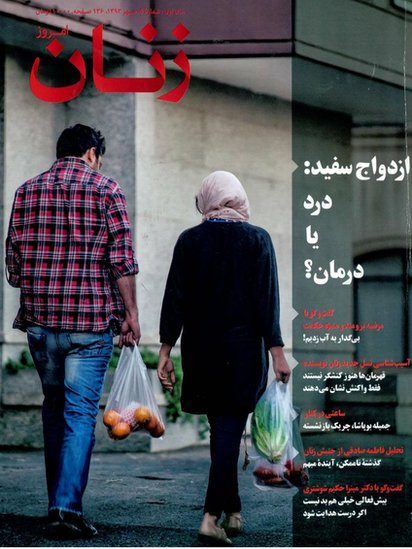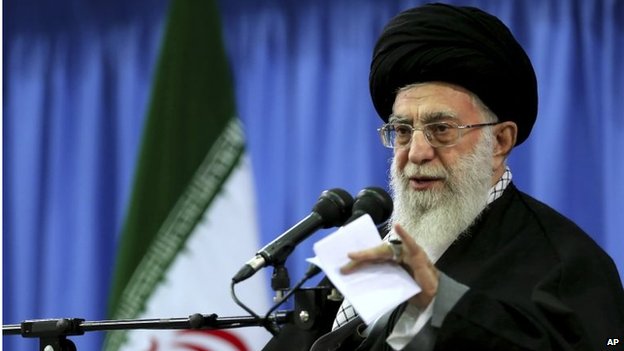Bratva
PDF THINK TANK: ANALYST

- Joined
- Jun 8, 2010
- Messages
- 13,832
- Reaction score
- 67
- Country
- Location

Despite Iran's strict Islamic laws, increasing numbers of young couples are choosing to live together before marriage. It has become so prevalent that the office of the Supreme Leader has issued a statement expressing deep disapproval, as BBC Persian's Rana Rahimpour reports.
"I decided to live with my boyfriend, because I wanted to get to know him better," says Sarah from Tehran.
"It's hard to get to know someone just by going to restaurants and cafes together."
Sarah's decision to enter into what is known in Iran as "white marriage" would have been unthinkable just a few years ago.
In a country where strict Islamic laws mean shaking hands with the opposite sex is illegal, cohabitation is a crime that risks severe punishment.
“Start Quote
Just like in the rest of the world, the middle class in Iran is starting to prefer this type of life to traditional marriage”
Mehrdad Darvishpour Sociologist
Nevertheless, increasing numbers of unmarried couples are now choosing to live together.
There are no official statistics, but it has become common enough for a popular women's magazine, Zanan, to devote a special issue to the subject recently.
And now even Iran's Supreme Leader, Ayatollah Khamenei has joined the debate.
At the end of November the head of his office, Mohammad Mohammadi Golpayegani, issued a strongly worded statement calling on officials to "show no mercy" in clamping down on cohabitation.
"It's shameful for a man and a woman to live together without being married," the statement said. "It won't take long for people who've chosen this lifestyle to have wiped out a legitimate generation with an illegitimate one."
Divorce rates
But young Iranians do not seem to be listening.
"It's too expensive to get married and even more expensive to get a divorce," says Ali from Tehran, who has been living with his girlfriend for two years.

Zanan magazine devoted a recent issue to the subject of cohabitation
"Why commit myself to something I'm not sure about?"
It is attitudes like this that show just how far some young urban Iranians have moved away from the Islamic values of their parents' generation.
"Of course cohabitation is not accepted by the more religious parts of society," says sociologist Mehrdad Darvishpour, who is now based in Sweden.
"But just like in the rest of the world, the middle class in Iran is starting to prefer this type of life to traditional marriage. Sex before marriage isn't taboo anymore."
Many observers point to Iran's soaring divorce rates as a key reason why some couples do not want to rush into marriage - and why their families often agree with them.
One in five marriages in Iran ends in divorce, says Farhad Aghtar, Director General of the Office of Drug Abuse Prevention and Treatment, which is part of Iran's State Welfare Organisation. Tehran, the capital, has the highest rate in the whole country.
Social stigma
In Iran it is the groom's family who pay for the wedding, which is often a lavish and costly affair.
The groom also has to put up the money for a dowry or "mahrieh" - a payment to be made to the bride if the marriage breaks down.
Large sums of money are often involved here, too, and men can end up in debt for years after a divorce. Failure to pay can result in imprisonment.
For Iranian women, the prospect of marriage breakdown is also bleak.
Islamic law means it is difficult for women to initiate divorce in the first place. Custody laws automatically favour the father and social stigmas mean life for divorced women is not easy.
Sarah says one reason she decided to live with her current boyfriend was precisely because a previous relationship had broken down when the man's family made it clear they did not think a marriage between the two would last.
"His parents and siblings interfered a lot," she said. "They said I was a loose woman. They put so much pressure on him that in the end he broke up with me."
No support
But choosing to live together is not always an easy option.
Although some urban parents are willing to accept their children's decisions, cohabitation is still considered a step too far by many in what remains a deeply traditional society.

Marjan, who lived with her boyfriend in the city of Arak, says she had to move house four times after landlords found out she and her boyfriend were not married.
"Every day they would ask, 'When are you going to get married? When are you going to buy a ring?'" she said. "I'd think - they're watching me, so I'd try to find another place."
Another problem, according to lawyer and women's rights activist Mehrangiz Kaar, is that because cohabitation is illegal, there is no legal support for couples if things go wrong.
If a woman is abused in a "white marriage", she cannot go to the police, because she and her partner would be arrested for committing adultery, Mrs Kaar said.
This summer, the head of social and cultural affairs at the office of the governor of Tehran, Siavash Shahriar, announced that a plan had been finalised to tackle "white marriage" and, in his words, "to promote family stability". But to date no specific plans have been made public.
Sociologist Mehrdad Darvishpour is sceptical about attempts to use the law to deal with issues affecting people's personal lives.
"What happens under the skin of a society cannot be controlled," he said.
"The government might try to use force to stop this, just as they tried to impose stricter adherence to the rules on wearing a hijab [headscarf] on young women, but young people will continue to move forward. Modernity can't be stopped."
BBC News - Can Iran 'control' its cohabiting couples?
By Golnaz Esfandiari
December 06, 2014
Raana and Hamed have been living together for four years.
They eat together. They both contribute to the household and share a savings account. They fight "like husbands and wives in a registered marriage." They even wear wedding rings and introduce themselves as a married couple.
But they're not. Because, as they also told Iranian daily "Ebtekar" in May, they don't believe in marriage.
Their arrangement is being described in Iran as a "white marriage," a relatively new phenomenon that is worrying Iranian authorities.
Officials there see couples like Raana and Hamed as an affront to the Islamic values that are preached and enforced by the state through pressure and harassment.
On November 30, Mohammad Mohammad Golpayegani, the chief of staff for Iranian Supreme Leader Ayatollah Ali Khamenei, criticized cohabitating couples as "shameful" and warned that an entire generation would be doomed.
Golpayegani said "their halal generation will be extinguished and they will become bastards."
He declared that "the Islamic ruler should strongly fight this kind of life."
One day later, a deputy at Iran's Ministry of Youth Affairs and Sports blamed the media for fueling interest in so-called white marriages.
Mahmud Golzar allowed that some young Iranians might be cohabitating -- following the example of Western countries -- but he added to the semiofficial Fars news agency that such reports had not been confirmed.
If confirmed, he warned, the Islamic republic would confront those "ominous marriages," which have "very negatives effects" in Western countries, including the United States.
There are no reliable estimates of the number of couples cohabitating in Iran, where sexual relations outside of marriage are punishable by law. But public acknowledgement and warnings by officials, as well as media reports and anecdotal evidence, suggest that a number of Iranians in major cities have chosen cohabitation over wedlock.
Thirty-three-year-old Ali, who asked that RFE/RL not use his real name, is an engineer by profession who lived with his former girlfriend for several months before they broke up last year.
"We didn't want to get married but we wanted to be together, so she moved in," he said.
He added that they cohabitated despite their parents' disapproval.
Ali told RFE/RL that some of his friends and acquaintances had also chosen the unmarried route over wedlock.
"We basically want to live our lives the way we want," Ali said. "Now you can call it a white marriage or whatever you want."
He said he was aware of the risk he was taking, adding that "everything is risky and illegal in Iran, even partying."
Kids Will Be Kids
A Tehran-based observer said the possible rise in unmarried couples should be seen in the context of a new generation of Iranians who are turning their backs on tradition and state-promoted values.
"Attitudes are changing, a number of young people don't care about what other people might think or how the state might react, they are becoming increasingly independent," he told RFE/RL.
A desire to be free from the responsibilities and financial burden that come with wedding and married life appears to contribute to the perceived trend.
Mostafa Eghlima, the head of Iran's Society of Social Workers, believes that the so-called white marriages are similar to what "engagements" used to be like in Iranian society.
Eghlima told "Ebtekar" that one of the main reasons that families accept white marriages is because they want to be freed from the burden of responsibility.
"Girls and boys [in white marriages] can easily end their relationship without any problem and without any expectation," he said.
'Cultural Invasion'
Javid Samoudi, a psychologist based in the holy city of Qom, home to many of Iran's senior clerics, blamed such cohabitation on "cultural invasion," fading religious beliefs, weakening family ties, rising economic costs, and a desire for diversity and noncommitment among young people.
In an interview with the semiofficial ISNA news agency, he likened white marriages to "a microbe that pollutes men's views and damages the character and personality of women."
Sociologist Majid Abhari was quoted by Iranian media as saying that the "growing influence" of the Internet and satellite channels was behind white marriages.
The spread of cohabitation comes amid another headache for Iranian authorities: a reported decline in marriages and a soaring divorce rate.
Media reports suggest that in major cities such as Tehran, more than 20 percent of marriages end in divorce.
Authorities have said that marriage should be encouraged and facilitated for young people in order to preserve morals and fight the declining birthrate.
On December 1, presidential adviser Hessamedin Ashna noted that many people are concerned about white marriages. He suggested that if getting married was easy and affordable, Iranians would not choose cohabitation.
Ali, for his part, says he is not planning to get married anytime soon. With a laugh, he says the idea of another white marriage is more appealing to him.
Rise In Cohabitation Has Iran Officials Railing Against 'White Marriage'
Last edited:
